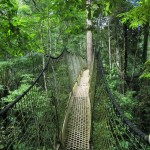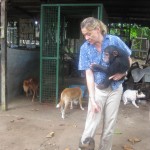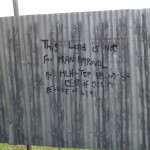As part of IBM CSC program, I travelled to the city of Calabar which is located in Cross River State, Nigeria. Cross River State is located in South East Nigeria and Calabar was once a major slave trade port between 17th and 19th century. The CSC program is one of a kind where IBM sends its employees to help a community address some of its problems. IBM works with NGOs in identifying assignments and sends a group of 10-15 people to handle the projects. The tasks do not have to be necessarily technical. Each team is further sub divided into a smaller size to undertake multiple projects within an assignment. For example, I worked with another IBM’er to help Department of Public Transportation of Cross River state to enhance the skill sets of the organization and get a Document Management system setup. Ten other people who were part of the assignment worked on 5 other projects for the state. IBM also typically sends more than one team (in a sequential fashion) to the same community/city/state to keep up the continuity and ensure that projects are being sustained. This program is part of IBM’s corporate citizen portfolio program and one of the ways IBM fulfills its social responsibility. And each assignment typically lasts a month. I was privileged to be allowed to participate in one of the assignments.
Cross River State is named after “Cross River” that runs through the state. Weather is tropical and it was rainy season when I was there. The rains managed to cool down the temperature. It was still very humid though and at times I would sweat just standing. The state itself is very green, though Nigeria as a country has suffered tremendous deforestation. Calabar, the city where I stayed and worked for a month seemed a lot like a town in Kerala – lots of greenery with homes topped by triangular shaped tin roofs. Main highways and major streets in and around Calabar seemed well maintained with 2 lanes on each side with a divider. Interior areas of the city is lacking in good roads (like village roads in India), but cars do manage to get in somehow. The sewer system in the city was good enough to prevent flooding even with prolonged stint of rain.
Motor bikes have been recently banned in the city of Calabar (a brave move by the Department of Public Transportation) to primarily reduce accident rates. Motorbikes were also used as taxis to commute citizens from areas where cars cannot go. The government has since then subsidized purchase of cars to enable a smoother transition for these motorbike taxi owners. However, this has led to more congestion during peak times. I am ambivalent about this ban, but government is convinced this was the right move.
During such trips, I prefer mingling with the local people, talking to them and getting to know them rather than the canned tours. One the highlights of my trip were a 3 hour walk in and around the market area with few of my IBM colleagues. Most of the local people were extremely nice and would not hesitate to talk to us even though we may be annoying them with touristy questions. A few of the folks, particularly the older generation, were very averse to photos being taken. The aversion I believe is due to the fear of being exploited (perhaps via magazines etc. that highlights the poor conditions of the people). Once, we explained that we had no such intentions, they seemed OK. However, I made sure I got the permission of parents before I took pictures of their children.
I visited a small museum which is all about slave trade and the suffering the slaves underwent as they were shipped from Africa to other countries. It was a pretty graphic experience with life sized models, scenarios and audio that reminded one of the gruesome cruelty suffered by Africans. During the museum visit was when we realized why the “N” word is so despised by current generation African Americans. Obviously it is derived from Nigeria (or Niger) and probably reminds them of horrific times their ancestors had as slaves.
Another place we visited was Obudu – a scenic mountain resort (about 1500 meters above sea level) that boasts the longest cable car in the world. The ride down from Obudu in this cable car is heavenly and it feels like you float in the clouds at times. On the way back from Obudu, visited the Drill Ranch situated in the Afi mountains and is a place dedicated to protecting the endangered drill monkey and chimps. This is a selfless effort founded by 2 Americans Peter Jenkins and Liza Gadsby who have dedicated their life to rehabilitating the drills. Bush meat is coveted by certain section of the population in Nigeria and the government has not been able to protect the chimps and drills from being killed. Thus, the eventual goal of sending these animals back into the wild has not been realized. Irrespective, the work of the 2 Americans is inspiring. The walk to see the animals (safeguarded in a huge enclosure) is through a section of the forest in Afi Mountains. This forest also boasts a canopy walkway made of 8 bridges and the walk across these bridges while enjoying nature at its best was a wonderful experience. Even though the visit to Obudu and Drill ranch was short, I am thankful for the effort made by Cross River state to take us on this tour (they provided us with the vehicle and security).
The state of Calabar and IBM made sure our stay was safe and secure and the people in Nigeria made us feel absolutely welcome. It has been more than 10 days since I left Nigeria, and I still recall the good times we had at least few times a day.
In the next post, I will try and cover a bit more about politics (whatever little I know), religion, people, language, food and the project itself.
References:
Articles related to Motor cycle ban:
http://thenationonlineng.net/web2/articles/28404/1/Cross-River-Okada-bad-taxis-good/Page1.html
About Peter Jenkins and Liza Gadsby – http://afp.google.com/article/ALeqM5j9OJQ5l6b1-QYA6L9QGJy01GrPcA
Drill ranch and Afi Mountain: http://www.pandrillus.org/projects/drill-ranch/visitor-information/
Cross River state government web site: http://www.crossriverstate.gov.ng/
Department of Public Transportation web site (Department I worked with): http://www.transport.crs.gov.ng/



























